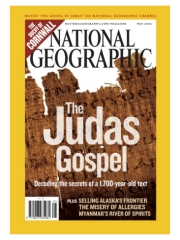 Many believe that the gnostic gospels are a challenge to Christianity; some even think that it is a serious challenge. My personal reaction to this has always been fairly apathetic. I’ve never seen much reason to take the gnostic gospels as either historically serious accounts or a reason to throw out orthodox writings as more of the same.
Many believe that the gnostic gospels are a challenge to Christianity; some even think that it is a serious challenge. My personal reaction to this has always been fairly apathetic. I’ve never seen much reason to take the gnostic gospels as either historically serious accounts or a reason to throw out orthodox writings as more of the same.
This is to say that the fact that the mystery religions adapted the Christian story in order to promote beliefs more in line with greek philosophy is hardly surprising. All at really seems to establish is that Christianity was a known religion in the areas in which the gnostic gospels were written.
But very few people today take the gnostic writings to be credible. Rather, it is sometimes asked, how do we know that the writings eventually compiled into the New Testament are any more reliable? This is a good question, though it is has been answered by historians.
There are a few reasons for this, in fact. The orthodox writings are older, are written in the style of reports (unlike the gnostic gospels), and otherwise show more knowledge of the area near Jerusalem, to name two.
However, I’ve since run across an argument for taking the books more seriously–not as a refutation for Christianity, but as a support for it.
That is to say that the gnostic gospels constitute an excellent example as to what writing a story like Christianity’s, but divorced from the facts of history, would look like. The authors of these books not only fail to offer anything like the detailed information about the region, they clearly don’t know what Jewish people named their children (giving greek names to many characters).
The Christian gospels, on the other hand, are clearly written by people with knowledge of the area and its people. All of the information we’ve been able to gather has confirmed this.
For those interested, Peter Williams has presented an excellent summary of the argument (which is too long to present here). And, if he is correct, the gnostic gospels do more to highlight the New Testament’s signs of authenticity than they do to challenge Christianity.
So, while there’s nothing undeniably conclusive here, it is a point worth making for those who are concerned about the issues raised by the gnostic gospels.
May 14th, 2013 at 8:21 am
You make a compelling point, one I will no doubt repeat when in conversations with fans of the latest gnostic attention grabbers.
May 31st, 2013 at 8:14 pm
Revelation 1:1: “A revelation by Jesus Christ, which God gave him, to show his slaves the things that must shortly take place. And he sent forth his angel and presented [it] in signs through him to his slave John, ”
God gave Jesus the revelation and Jesus gave John the revelation in SIGNS.
Right ‘off the bat’, we are told that Revelation was written in signs.
June 1st, 2013 at 7:59 am
I completely agree with that idea. Revelation is definitely very symbolic.
But I’m not sure how this relates to the rest of the discussion. Is this the claim that, therefore, all of the New Testament should be taken as symbolic?
July 8th, 2013 at 4:21 am
If we are to dismiss the Gnostic texts, why should we accept the current biblical texts?
Maybe you would like to provide a comprehensive list of the gospel and Old Testament facts that can be compared with the so-called heretical documents, and why not give explicit reasons?
It would be a fascinating blog post.